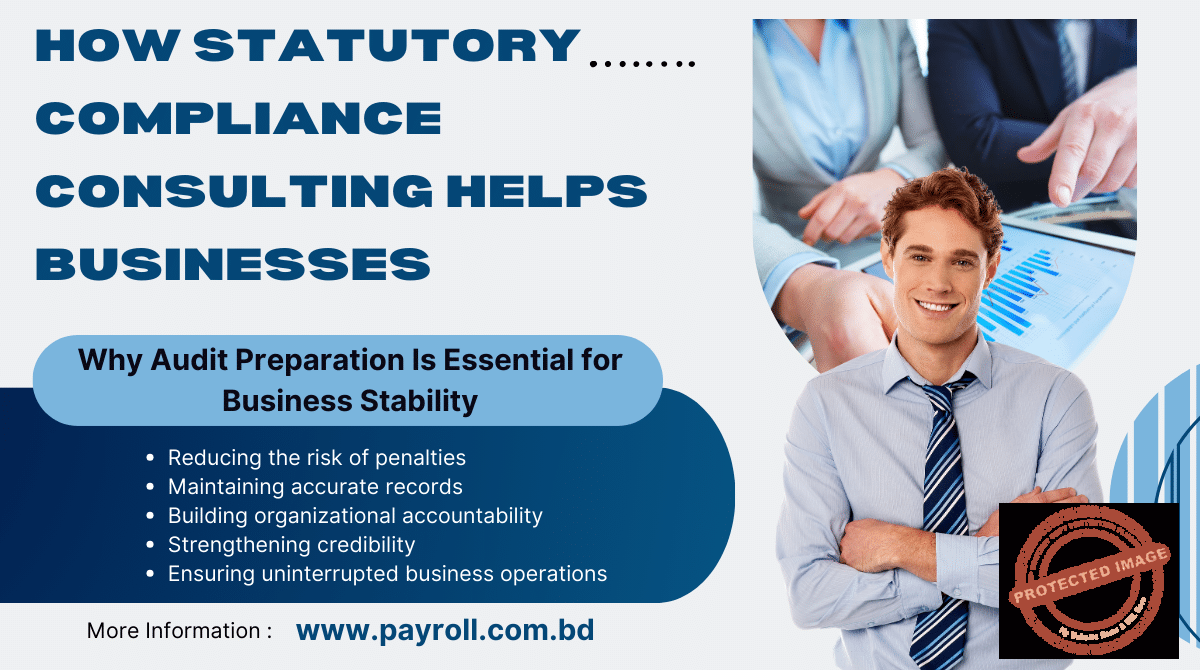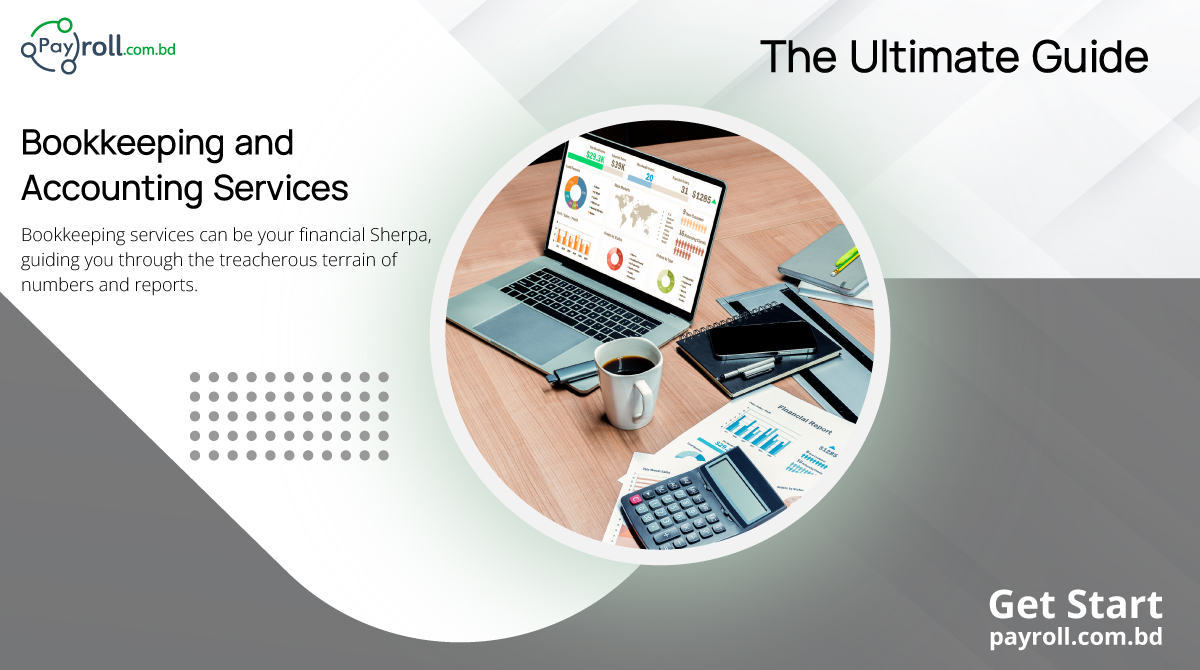Think about having an expert who knows all the rules and regulations that your growing…

How Statutory Compliance Consulting Helps Businesses Prepare for Government Audits
Government audits have become a routine part of business operations in Bangladesh, especially as regulations surrounding labor laws, taxation, payroll, and social insurance continue to evolve. Companies that fail to maintain accurate records or comply with statutory requirements often face penalties, legal complications, and reputational damage.
For businesses—especially SMEs and growing enterprises—navigating these compliance expectations can be challenging without expert guidance.
Statutory compliance consulting helps organizations stay prepared long before an audit takes place. From documentation accuracy to regulatory alignment, consultants ensure businesses meet legal obligations while reducing risk exposure.
Payroll BD supports companies with structured compliance systems that simplify audit preparation and strengthen long-term regulatory sustainability.
Why Audit Preparation Is Essential for Business Stability
Government audits ensure that businesses follow labor standards, tax regulations, and social security requirements. However, many companies are unprepared because they lack proper documentation or compliance knowledge. Effective audit preparation safeguards business continuity, reduces legal risks, and strengthens internal governance.
Here’s a closer look at the core elements:
- Reducing the risk of penalties: Proper preparation helps companies avoid fines linked to labor law or tax violations.
- Maintaining accurate records: Organized documents ensure smoother audit reviews and faster completion.
- Building organizational accountability: Audit-ready systems encourage disciplined operations.
- Strengthening credibility: A well-prepared company earns trust from government authorities and stakeholders.
- Ensuring uninterrupted business operations: Prevents delays or disruptions caused by compliance discrepancies.
With efficient audit preparation processes in place, businesses operate confidently and maintain compliance integrity year-round.
How Statutory Compliance Consulting Identifies Compliance Gaps
Many organizations unknowingly operate with compliance weaknesses—missing records, outdated policies, incorrect payroll calculations, or inconsistent tax filings. These issues often surface during government audits and can lead to severe consequences. Statutory compliance consultants help businesses detect these vulnerabilities early and align operations with Bangladeshi regulations.
Below are the issues businesses face—and how we fix them:
- Outdated HR and payroll policies
- Incomplete worker documentation
- Incorrect payroll calculations
- Inaccurate tax and VAT compliance
- Missing social insurance records
Identifying and resolving these gaps early helps businesses strengthen their compliance posture and minimize audit risks.
Documentation and Record-Keeping Support for Audit Readiness
Proper documentation is the foundation of a successful government audit. Many companies struggle to maintain organized, updated records due to manual processes or poorly structured HR and payroll systems. Statutory compliance consultants streamline documentation so businesses can provide evidence quickly and confidently during audits.
The details are highlighted below:
- Ensuring that ID proofs, contracts, and personal information are complete and updated.
- Properly documenting payslips, wage sheets, overtime logs, and salary revisions.
- Supporting companies in maintaining all statutory registers required under Bangladesh law.
- Ensuring income tax deductions, statements, and remittances are correctly filed.
- Introducing digital systems that reduce errors and ensure easy record retrieval.
With structured record-keeping practices, businesses approach audits with confidence and clarity.
Streamlining HR, Payroll, and Tax Processes Before an Audit
Before a government audit takes place, businesses must ensure that HR, payroll, and tax processes reflect accurate, up-to-date compliance standards. This often requires system upgrades, process restructuring, and enhanced internal controls. Statutory compliance consulting ensures all systems and workflows function smoothly without gaps or inconsistencies.
Here are the most important improvements consultants provide:
- Standardizing payroll workflows: Ensuring wage calculations and deduction processes follow regulatory requirements.
- Strengthening attendance and leave systems: Integrating automated tracking to support accurate labor reporting.
- Improving tax deduction and filing accuracy: Ensuring proper compliance with salary tax slabs and reporting obligations.
These streamlined processes support efficient audits and strengthen long-term compliance health.
Ongoing Monitoring and Compliance Maintenance for Future Audits
Preparing for one audit is not enough; businesses must remain compliant throughout the year to avoid future risks. Statutory compliance consultants provide ongoing monitoring, periodic reviews, and updated legal guidance to ensure organizations stay aligned with new regulations and evolving requirements.
Here’s a closer look at the core elements:
- Regular internal reviews help organizations correct issues proactively.
- Consultants ensure businesses stay informed about regulatory changes.
- Digital tools support instant visibility of compliance status.
These ongoing monitoring measures ensure companies are always ready for government audits—not just during audit season.
Conclusion
Statutory compliance consulting plays a vital role in helping Bangladeshi businesses prepare for government audits with accuracy and confidence. From detecting compliance gaps to organizing essential records and strengthening internal processes, consultants ensure that organizations meet all legal requirements without disruption.
Payroll BD provides structured, reliable, and audit-focused compliance services that help companies minimize legal risks, maintain business continuity, and uphold their reputation. With expert guidance, businesses can transform compliance from a challenge into a long-term strategic advantage.
FAQs
Labor audits, payroll audits, tax audits, VAT audits, and social insurance compliance reviews.
Businesses must provide employee records, payroll sheets, tax filings, statutory registers, and relevant HR documents.
Absolutely—smaller businesses often lack in-house compliance expertise and face higher risks during audits.
Most companies benefit from quarterly or bi-annual compliance audits to stay prepared year-round.
Key Takeaways
- Consultants identify compliance gaps early to prevent fines and legal risks.
- Proper documentation and structured records are essential for smooth audit processes.
- Streamlined HR, payroll, and tax systems support long-term compliance success.



